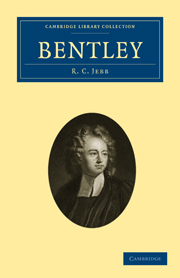Book contents
- Frontmatter
- PREFATORY NOTE
- Contents
- CHAPTER I EARLY LIFE. THE LETTER TO MILL
- CHAPTER II THE BOYLE LECTURES
- CHAPTER III LEARNED CORRESPONDENCE. THE KING'S LIBRARIAN
- CHAPTER IV THE CONTROVERSY ON THE LETTERS OF PHALARIS
- CHAPTER V BENTLEY'S DISSERTATION
- CHAPTER VI TRINITY COLLEGE, CAMBRIDGE
- CHAPTER VII BENTLEY AS MASTER OF TRINITY
- CHAPTER VIII LITERARY WORK AFTER 1700.—HORACE
- CHAPTER IX OTHER CLASSICAL STUDIES. — TERENCE. — MANILIUS. — HOMER
- CHAPTER X THE PROPOSED EDITION OF THE NEW TESTAMENT
- CHAPTER XI ENGLISH STYLE. EDITION OF PARADISE LOST
- CHAPTER XII DOMESTIC LIFE. LAST YEARS
- CHAPTER XIII BENTLEY'S PLACE IN THE HISTORY OF SCHOLARSHIP
CHAPTER VIII - LITERARY WORK AFTER 1700.—HORACE
Published online by Cambridge University Press: 07 September 2010
- Frontmatter
- PREFATORY NOTE
- Contents
- CHAPTER I EARLY LIFE. THE LETTER TO MILL
- CHAPTER II THE BOYLE LECTURES
- CHAPTER III LEARNED CORRESPONDENCE. THE KING'S LIBRARIAN
- CHAPTER IV THE CONTROVERSY ON THE LETTERS OF PHALARIS
- CHAPTER V BENTLEY'S DISSERTATION
- CHAPTER VI TRINITY COLLEGE, CAMBRIDGE
- CHAPTER VII BENTLEY AS MASTER OF TRINITY
- CHAPTER VIII LITERARY WORK AFTER 1700.—HORACE
- CHAPTER IX OTHER CLASSICAL STUDIES. — TERENCE. — MANILIUS. — HOMER
- CHAPTER X THE PROPOSED EDITION OF THE NEW TESTAMENT
- CHAPTER XI ENGLISH STYLE. EDITION OF PARADISE LOST
- CHAPTER XII DOMESTIC LIFE. LAST YEARS
- CHAPTER XIII BENTLEY'S PLACE IN THE HISTORY OF SCHOLARSHIP
Summary
From the beginning of 1700 to the summer of 1702 Bentley was constantly occupied with University or College affairs. On August 2, 1702, he writes to Graevius at Utrecht: ‘ You must know that for the last two years I have hardly had two days free for literature.’ This was perhaps the longest decisive interruption of literary work in his whole life. Nearly all his subsequent writings were finished in haste, and many of them were so timed as to appear at moments when he had a special reason for wishing to enlist sympathy. But his studies, as distinguished from his acts of composition, appear to have been seldom broken off for more than short spaces, even when he was most harassed by external troubles. His wonderful nerve and will enabled him to concentrate his spare hours on his own reading, at times when other men would have been able to think of nothing but threatened ruin.
His early years at Trinity College offer several instances of his generous readiness to help and encourage other scholars. One of these was Ludolph Kiister, a young Westphalian then living at Cambridge, whom Bentley assisted with an edition of the Greek lexico grapher Suidas, and afterwards with an edition of Aristophanes. Another was a young Dutchman, destined to celebrity, —Tiberius Hemsterhuys. Bentley had sent him a kindly criticism on an edition of Julius Pollux, pointing out certain defects of metrical knowledge. The effect on Hemsterhuys has been described by his famous pupil, David Ruhnken. At first he was plunged in despair: then he roused himself to intense effort. To his dying day he revered Bentley, and would hear nothing against him.
- Type
- Chapter
- Information
- Bentley , pp. 124 - 135Publisher: Cambridge University PressPrint publication year: 2010First published in: 1882



